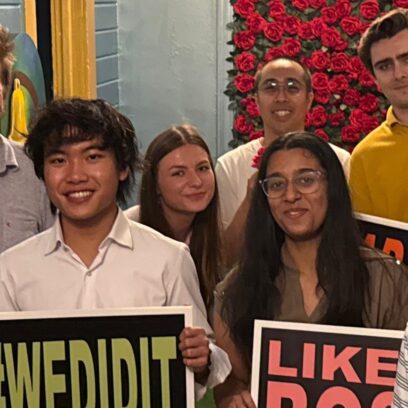Our Takeaways from GreenBiz 25

Skip the RFP—CarbonBetter can help
CarbonBetter Certified Offset Portfolios allow carbon buyers to participate in a variety of projects, geographies, and technologies in one simple transaction rather than navigating a lengthy and complex RFP process with multiple carbon market participants.
Learn More about CBCO 22-1Sustainability is becoming a strategic business function, the effects of CSRD, and increased interest in the VCM.
Each year, GreenBiz gathers sustainability leaders, policymakers, and industry experts to discuss the latest trends in sustainability. At GreenBiz 25, it was clear that sustainability is evolving beyond compliance and risk management. Companies are increasingly recognizing it as a strategic function that delivers business value and informs corporate decision-making. The growing global impact of the Corporate Sustainability Reporting Directive (CSRD) and the increasing interest in Voluntary Carbon Markets (VCM) as companies work to meet their sustainability goals were also topics that were talked about this year. Below are our team’s top takeaways from GreenBiz 25.
Sustainability as a Strategic Function
Sustainability teams are increasingly positioning themselves as a strategic function rather than just supporting compliance and risk management. Sustainability leaders are securing a seat at the table, delivering measurable value to the business, and actively informing business strategy.
Our perspective has always been that a well-designed sustainability strategy should complement an organization’s overall business strategy, and it was encouraging to see this sentiment echoed throughout the conference. Companies are moving beyond viewing sustainability as an obligation and instead recognizing it as an opportunity to drive long-term success.
Increased Interest in Voluntary Carbon Markets
Companies are increasingly exploring the VCM as part of their sustainability strategy. There is growing recognition that the VCM can play an important role in compensating for unavoidable emissions.
With significant efforts underway to increase the credibility of carbon markets—through initiatives like the Integrity Council for the Voluntary Carbon Market (ICVCM) labeling and independent ratings agencies—companies are becoming more open to buying high-quality carbon credits and integrating them into their decarbonization strategies. More businesses are also sharing their carbon credit purchases transparently, signaling a shift toward greater confidence and accountability in the market.
Regulatory Compliance and CSRD’s Growing Impact
A major focus at GreenBiz 25 was the impact of CSRD and other emerging regulations on businesses. Companies are preparing for CSRD not just in Europe but in the US as well. While some US companies still have a few years before they must comply with CSRD reporting requirements, many are acknowledging that to remain competitive against European counterparts, they need to start identifying material impacts, risks, and opportunities now.
“Sustainability is no longer just about compliance—it’s becoming a core part of business strategy.”
Pankaj Tanwar, Managing Director of Climate Services

🌍 Carbon markets can feel overwhelming—fragmented data, limited transparency, and conflicting advice make it hard to know where to start. In this webinar, our experts give a clear, practical introduction to the VCM.
This means conducting a a double materiality assessment within this calendar year to better understand and disclose how sustainability factors affect their business—and how their business impacts the environment and society. The regulatory landscape is evolving quickly, and companies that take early action will be better positioned to navigate these changes. Organizations must proactively adapt by strengthening their sustainability strategies and ensuring compliance to stay competitive in an increasingly regulated market.
Staying Positive Amid Regulatory Uncertainty
While shifting political landscapes can bring setbacks, GreenBiz 25 reinforced that the momentum for sustainable business isn’t driven by policy alone—it’s powered by people, innovation, and market demand. Businesses, investors, and consumers continue pushing for climate action, and sustainability remains a competitive advantage. Even when regulations shift, progress doesn’t stop.
By focusing on long-term impact, fostering collaboration, and celebrating wins—big or small—organizations can stay hopeful and keep moving forward toward a more sustainable future. While regulatory landscapes may change, the broader push for sustainability remains strong, and companies that stay the course will be best positioned for long-term success.
Conclusion
It was refreshing to see the VCM recognized as a valid part of a business's sustainability strategy, helping to abate emissions that cannot be avoided. Additionally, sustainability is increasingly being integrated into business strategy proactively rather than reactively. At CarbonBetter, we are excited to see these trends accelerating and remain committed to helping organizations navigate the complexities of sustainability. Whether through strategic planning, compliance support, or carbon market expertise, we are here to help companies turn sustainability goals into measurable progress. As the sustainability landscape continues to evolve, we look forward to staying at the forefront and leading the way.
Need help? No matter where you are in your sustainability journey, we're here to help. Contact us today to learn more.
Sustainability teams are increasingly seen as a strategic function rather than just supporting compliance and risk management. Leaders in this space are securing a seat at the table, contributing directly to business strategy, and driving measurable value for their organizations.
Even though some U.S. companies have a few years before they must report under CSRD, many are recognizing the need to act now to stay competitive with European counterparts. Conducting a Double Materiality Assessment within this calendar year can help businesses identify material risks and opportunities early.
A Double Materiality Assessment evaluates both how sustainability factors impact a company’s financial performance and how the company’s operations impact the environment and society. This process is becoming essential for businesses looking to align with global sustainability reporting standards like CSRD.
More companies are considering VCM as part of their sustainability strategies, recognizing its role in compensating for unavoidable emissions. With improved credibility through initiatives like ICVCM labeling and independent ratings agencies, businesses are increasingly open to purchasing and transparently sharing high-quality carbon credits.
Businesses should focus on integrating sustainability into corporate strategy, preparing for global reporting requirements like CSRD, and exploring credible carbon offset solutions through Voluntary Carbon Markets. These trends indicate a shift toward long-term, strategic sustainability planning.

About the Author
Pankaj Tanwar is Managing Director of Climate Services at CarbonBetter. He has experience leading Fortune 100 companies through their sustainability journeys, including sustainability driven growth in the food industry. Pankaj holds an MBA from Northwestern University’s Kellogg School of Management and a BTech in Mechanical Engineering from the Indian Institute of Technology, Kanpur.



